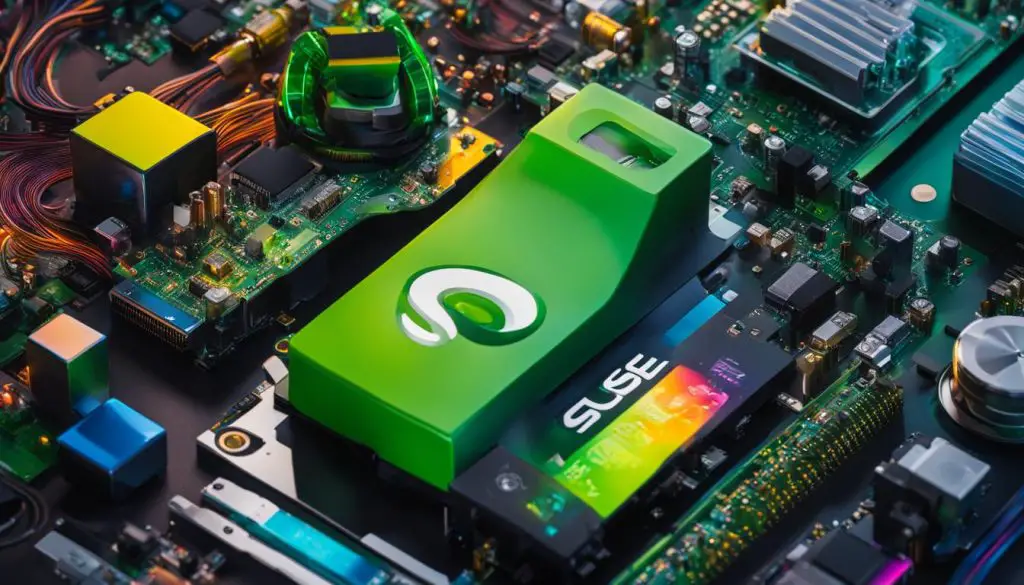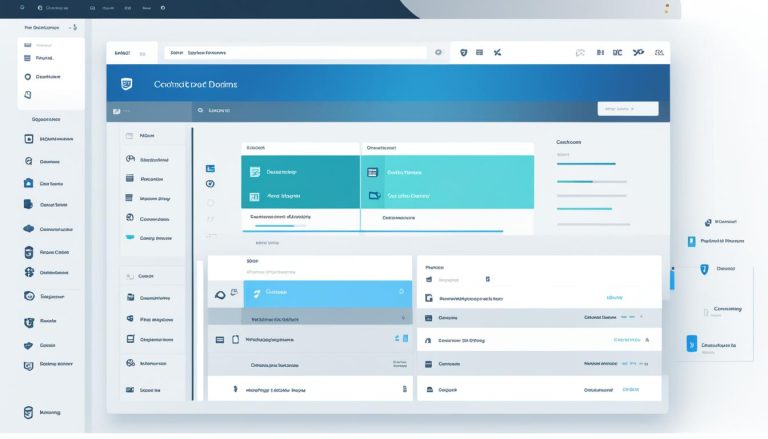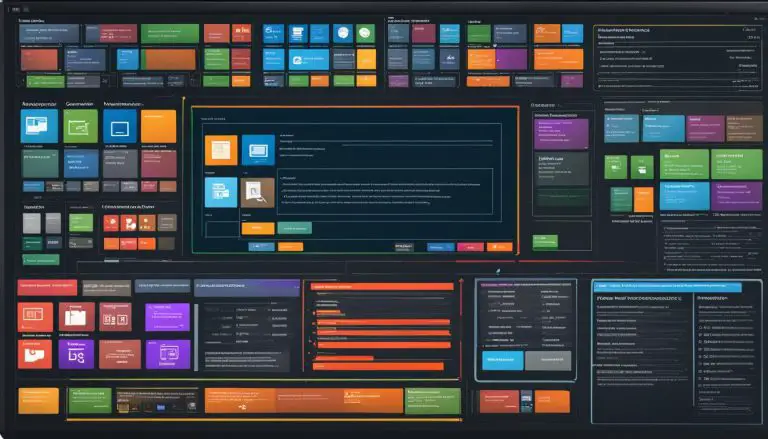In a Nutshell: What is SuSE Linux?
Gaining popularity among users, SuSE Linux is a robust and adaptable open-source operating system that offers a powerful alternative to other operating systems. With its reliable performance and extensive features, SuSE Linux has become a go-to choice for individuals and organizations alike.
Now, let’s delve deeper into the history, distribution, benefits, and uses of SuSE Linux.
Key Takeaways:
- SuSE Linux is an open-source operating system known for its reliability and adaptability.
- It has a rich history and has undergone several acquisitions, eventually becoming an independent subsidiary of Micro Focus International.
- SuSE Linux offers a comprehensive distribution with a wide range of software packages and tools.
- The operating system provides numerous advantages, such as stability, extensive software repository, and robust security features.
- SuSE Linux is used in various industries and environments, including as a server operating system and for software development.
A Brief History of SuSE Linux
SuSE Linux, founded in 1992 by Roland Dyroff and Hubert Mantel, started as a project to create a German version of Slackware Linux. Over the years, it has evolved into a leading Linux distribution, known for its stability, security, and ease of use. SuSE has undergone several acquisitions, with Novell acquiring it in 2003 and The Attachmate Group acquiring Novell in 2011. Eventually, SuSE became an independent subsidiary of Micro Focus International in 2014.
Throughout its history, SuSE Linux has established itself as a reliable and innovative operating system. It has continuously adapted and improved to meet the changing needs of users and organizations. With a strong focus on user experience, SuSE Linux has gained a reputation for its intuitive interfaces and user-friendly tools.
One of the key milestones in SuSE’s history was its partnership with Novell, which brought extensive resources, global reach, and enhanced support for enterprise customers. This collaboration further strengthened SuSE Linux’s position as a leading player in the Linux market.
| Year | Event |
|---|---|
| 1992 | SuSE Linux founded by Roland Dyroff and Hubert Mantel |
| 2003 | Novell acquires SuSE Linux |
| 2011 | The Attachmate Group acquires Novell |
| 2014 | SuSE becomes an independent subsidiary of Micro Focus International |
Since then, SuSE Linux has continued to innovate and expand its offerings, providing a robust and adaptable solution for individuals and organizations around the world.
SuSE Linux Distribution and Features
SuSE Linux offers a feature-rich and comprehensive distribution that caters to the diverse needs of users. Its robust package management system ensures easy installation, update, and removal of software packages, streamlining the user experience. The distribution includes a wide range of software packages and tools, encompassing various categories such as productivity applications, development frameworks, networking utilities, multimedia tools, and more. SuSE Linux provides users with a complete ecosystem that empowers them to fulfill their computing requirements efficiently.
One of the standout features of SuSE Linux is its emphasis on security. The operating system incorporates advanced security measures to safeguard users’ data and protect against potential threats. SuSE Linux utilizes robust encryption protocols, secure boot mechanisms, and a firewall system that provides granular control over network traffic. Regular security updates and patches further enhance the overall security posture of the operating system, ensuring a safe computing environment.
SuSE Linux also boasts excellent hardware compatibility and support for multiple architectures. Whether running on desktops, laptops, servers, or embedded devices, SuSE Linux delivers optimal performance and stability. Its versatility allows it to seamlessly integrate with various hardware components, enabling users to leverage the full potential of their systems. Additionally, SuSE Linux offers enterprise-level support and compatibility with a wide range of enterprise applications, making it a reliable choice for organizations with complex IT infrastructure.
In summary, SuSE Linux stands as an exceptional open-source operating system with a comprehensive distribution and a host of powerful features. Its robust package management system, emphasis on security, and compatibility with different hardware architectures make it a versatile and reliable choice for both individual users and organizations. With SuSE Linux, users can experience the freedom and flexibility of an open-source operating system while enjoying the stability and functionality required for their computing needs.
| Feature | Description |
|---|---|
| Robust Package Management | Easy installation, update, and removal of software packages |
| Comprehensive Software Ecosystem | Wide range of applications and tools for various needs |
| Advanced Security Measures | Encryption, secure boot, firewall for data protection |
| Hardware Compatibility | Support for multiple architectures and seamless integration |
| Enterprise-Level Support | Compatibility with enterprise applications and extensive support |
Advantages of SuSE Linux
SuSE Linux offers several advantages that make it a preferred choice for many users. Let’s explore some of the key benefits:
- Stability and Reliability: SuSE Linux is known for its excellent stability and reliability, making it suitable for critical applications and long periods of uninterrupted operation.
- Extensive Software Repository: SuSE Linux provides access to a vast software repository, offering a wide range of applications and tools to cater to diverse needs.
- Robust System Administration: With its comprehensive system administration features, SuSE Linux makes it easy to manage and configure the operating system, providing users with greater control over their environment.
- Advanced Security Features: SuSE Linux prioritizes security and offers robust security features, regular updates, and a vigilant community to ensure a secure computing experience.
“SuSE Linux delivers exceptional stability and reliability, ensuring uninterrupted operation for critical applications.”
In addition to these advantages, SuSE Linux also offers cost-effectiveness as it is available as a free and open-source operating system. This eliminates the need for expensive software licenses, making it an attractive option for budget-conscious users. SuSE Linux is highly customizable, allowing users to tailor the system to their specific requirements. It also offers excellent compatibility with a wide range of hardware, reducing compatibility issues. Furthermore, SuSE Linux is known for its superior performance, scalability, and ability to handle heavy workloads.
Table: Comparison of SuSE Linux Advantages
| Advantages | Description |
|---|---|
| Stability and Reliability | Ensures uninterrupted operation for critical applications. |
| Extensive Software Repository | Access to a wide range of applications and tools. |
| Robust System Administration | Comprehensive features for easy management and configuration. |
| Advanced Security Features | Prioritizes security with regular updates and a supportive community. |
| Cost-Effective | Available as a free and open-source operating system. |
| Highly Customizable | Allows tailoring of the system to specific requirements. |
| Excellent Compatibility | Compatible with a wide range of hardware. |
| Superior Performance | Delivers exceptional performance and handles heavy workloads. |
Overall, SuSE Linux’s advantages make it a reliable and adaptable choice for individuals and organizations looking for a powerful operating system that offers stability, flexibility, security, and cost-effectiveness.

SuSE Linux Benefits
SuSE Linux offers a wide range of benefits that make it a valuable choice for individuals and organizations. Whether you’re a budget-conscious user or a business looking for a reliable and customizable operating system, SuSE Linux has plenty to offer. Let’s explore some of the key benefits it provides.
Cost-Effective Solution
One of the major advantages of SuSE Linux is its cost-effectiveness. As an open-source operating system, SuSE Linux is freely available, eliminating the need for expensive software licenses. This makes it an attractive option for individuals and businesses looking to reduce their IT costs without compromising on performance and functionality.
Customizability and Compatibility
SuSE Linux offers a high level of customizability, allowing users to tailor the operating system to their specific requirements. With a wide range of software packages and tools, users can easily customize their computing environment to suit their needs. Additionally, SuSE Linux provides excellent compatibility with various hardware architectures, ensuring a seamless experience across different systems.
Superior Performance and Scalability
One of the standout features of SuSE Linux is its superior performance and scalability. It is designed to handle heavy workloads and can efficiently run on servers, making it ideal for both personal and enterprise use. With its robust architecture and efficient resource management, SuSE Linux delivers excellent performance even under demanding conditions.
| Benefits of SuSE Linux | Description |
|---|---|
| Cost-Effective | SuSE Linux is freely available, eliminating the need for expensive software licenses. |
| Customizable | Users can tailor SuSE Linux to their specific requirements, creating a personalized computing environment. |
| Compatible | SuSE Linux offers excellent compatibility with various hardware architectures, ensuring seamless integration. |
| Superior Performance | SuSE Linux delivers outstanding performance and scalability, handling heavy workloads effortlessly. |
With its cost-effectiveness, customizability, compatibility, and superior performance, SuSE Linux emerges as a compelling choice for individuals and businesses seeking a reliable and adaptable operating system.
Different Uses of SuSE Linux
SuSE Linux finds diverse applications in various industries and environments due to its versatility and functionality. Its robustness and security features make it a popular choice as a server operating system. SuSE Linux powers web servers, file servers, and database servers, providing stability and reliability for critical enterprise applications. As a developer’s platform, SuSE Linux offers a reliable and customizable environment for software development and testing. Its compatibility with different hardware architectures makes it suitable for educational institutions, government organizations, and research facilities.
Server Operating System
One of the primary uses of SuSE Linux is as a server operating system. Whether it’s powering web servers, database servers, or file servers, SuSE Linux provides the stability and security required for critical enterprise applications. Its robustness ensures uninterrupted operation and efficient handling of heavy workloads.
Development Platform
SuSE Linux also serves as an excellent platform for developers and programmers. With its comprehensive suite of development tools and libraries, it provides a reliable environment for software development and testing. SuSE Linux’s compatibility with various programming languages and frameworks makes it an ideal choice for building and deploying applications.
Education and Research
In the education and research sectors, SuSE Linux is widely used for its versatility and functionality. Its compatibility with different hardware architectures, extensive software repository, and comprehensive features make it a valuable tool for educational institutions, government organizations, and research facilities. SuSE Linux allows users to leverage its capabilities in diverse academic and research activities.
| Use Cases | Description |
|---|---|
| Server Operating System | SuSE Linux is widely used as a reliable and secure server operating system, providing stability and efficiency for critical enterprise applications. |
| Development Platform | SuSE Linux offers a robust and customizable environment for developers and programmers, enabling software development and testing. |
| Education and Research | SuSE Linux is used in educational institutions and research facilities for its versatility and functionality, supporting diverse academic and research activities. |
Summary
SuSE Linux has a wide range of uses in different industries and environments. Its reliability, security, and versatility make it an excellent choice as a server operating system for critical enterprise applications. Additionally, SuSE Linux provides a robust development platform for software development and testing. Its compatibility with various hardware architectures and comprehensive features also make it suitable for educational institutions and research facilities.
SuSE Linux Operating System
SuSE Linux is a complete operating system that provides all the necessary components for running applications and managing resources. It offers a seamless user experience with its intuitive graphical user interface (GUI) and user-friendly tools, making it accessible to both novice and experienced users.
The operating system supports various file systems, including Ext4, Btrfs, and XFS, allowing users to choose the most suitable option for their specific needs. SuSE Linux also supports multiple networking protocols, such as TCP/IP, DHCP, and DNS, ensuring seamless connectivity in both local and wide area networks.
One of the key strengths of SuSE Linux is its robust security features. It includes built-in firewalls, encryption tools, and security auditing capabilities to protect the system from unauthorized access and data breaches. The operating system also benefits from regular updates and patches, ensuring that users have the latest security enhancements.
In addition to its core functionalities, SuSE Linux offers a wide variety of software applications and tools. Users can leverage the extensive software repository to enhance their productivity and cater to their specific needs. From office productivity suites to multimedia editing tools and development environments, SuSE Linux provides a comprehensive ecosystem of software options.

Key Features of SuSE Linux:
- Intuitive graphical user interface (GUI)
- Support for multiple file systems
- Wide range of networking protocols
- Robust security features
- Regular updates and patches
- Extensive software repository
“SuSE Linux provides a complete and reliable operating system that offers seamless user experience, robust security features, and a wide range of software options.”
In summary, SuSE Linux is a powerful operating system that combines reliability, security, and versatility. It provides users with a complete solution for their computing needs, offering an intuitive interface, strong security measures, and a vast software ecosystem. Whether used for personal or enterprise purposes, SuSE Linux is an excellent choice for those seeking a stable and feature-rich operating system.
SuSE Linux: A Reliable and Adaptable Choice
SuSE Linux is renowned for its reliability and adaptability. It undergoes rigorous testing and quality assurance processes, ensuring a stable and bug-free experience for users. Whether used for personal or enterprise purposes, SuSE Linux offers a dependable and adaptable solution for all computing needs.
One of the key advantages of SuSE Linux is its reliability. As an open-source operating system, it benefits from continuous improvements and bug fixes contributed by a large community of developers. This ensures that the system is robust and stable, capable of handling demanding workloads and providing uninterrupted operation. Whether you are running a web server or managing critical enterprise applications, SuSE Linux can be relied upon to deliver consistent performance.
Adaptability is another strength of SuSE Linux. With its flexible configuration options and extensive documentation, users have the freedom to customize the system to meet their specific requirements. Whether you need to optimize performance, enhance security, or tailor the user interface, SuSE Linux provides the tools and resources to make it happen. Its versatility extends to hardware compatibility as well, making it compatible with a wide range of devices and computer architectures.
Overall, SuSE Linux offers a reliable, secure, and highly customizable operating system that can adapt to the needs of any user or organization. Its robustness and adaptability make it a preferred choice for those seeking a dependable and versatile computing solution.
SuSE Linux: Building a Strong Community
SuSE Linux boasts a vibrant and active community that plays a crucial role in the ongoing development and improvement of the operating system. This community encompasses a diverse group of users, developers, and enthusiasts who are passionate about SuSE Linux and its capabilities.
The SuSE Linux community provides a platform for users to seek support, share their experiences, and collaborate on solutions. Online forums, mailing lists, and dedicated websites serve as valuable resources for troubleshooting, learning, and exchanging ideas. Whether you are a novice user or an experienced developer, you can find valuable insights and solutions through the collective knowledge of the SuSE Linux community.
“The SuSE Linux community is a testament to the power of collaborative efforts. The collective wisdom and expertise of its members contribute to the continuous improvement and innovation of SuSE Linux.”
Engaging with the SuSE Linux community also offers opportunities to contribute to the growth and evolution of the operating system. Users can provide feedback, suggest enhancements, and even contribute code to the project. This open and inclusive approach ensures that SuSE Linux remains a dynamic and responsive operating system, catering to the evolving needs of its users.
Furthermore, the strong sense of community fosters a spirit of collaboration, innovation, and mentorship. Experienced users and developers readily share their knowledge and expertise with newcomers, helping to nurture a new generation of SuSE Linux enthusiasts. The SuSE Linux community is not just a group of individuals; it is a supportive and passionate network that fuels the advancement and success of SuSE Linux as an open-source project.
Conclusion
In conclusion, SuSE Linux is a versatile and powerful open-source operating system that offers a reliable alternative to proprietary systems. With its rich history and comprehensive distribution, SuSE Linux has gained popularity among individuals and organizations alike.
The advantages of SuSE Linux, such as stability, extensive software repository, and robust security features, make it an attractive choice for users. Its benefits, including cost-effectiveness, customizability, and superior performance, further enhance its appeal.
Whether used as a server operating system, a platform for software development, or in educational and research environments, SuSE Linux stands out for its reliability, adaptability, and functionality. Supported by a thriving community, SuSE Linux continues to evolve and improve, ensuring a secure and efficient computing experience for its users.
FAQ
What is SuSE Linux?
SuSE Linux is a robust and adaptable open-source operating system that offers a powerful alternative to other operating systems.
What is the history of SuSE Linux?
SuSE Linux was founded in 1992 as a project to create a German version of Slackware Linux. Over the years, it has evolved into a leading Linux distribution, known for its stability, security, and ease of use.
What features does SuSE Linux offer?
SuSE Linux offers a comprehensive distribution that includes a wide range of software packages and tools. It provides users with a complete ecosystem for their computing needs, including a desktop environment, office productivity tools, development frameworks, networking utilities, and more.
What are the advantages of SuSE Linux?
SuSE Linux offers excellent stability and reliability, an extensive software repository, robust security features, regular updates, and a supportive community.
What are the benefits of using SuSE Linux?
Using SuSE Linux provides a cost-effective solution, customization options, compatibility with a wide range of hardware, superior performance, scalability, and the ability to handle heavy workloads.
In what industries and environments is SuSE Linux used?
SuSE Linux is commonly used as a server operating system, in software development and testing, educational institutions, government organizations, and research facilities.
What is included in the SuSE Linux operating system?
SuSE Linux includes a kernel, utilities, libraries, and a graphical user interface (GUI) that allows users to interact with the system easily. It also supports various file systems, networking protocols, and security mechanisms.
Is SuSE Linux reliable and adaptable?
Yes, SuSE Linux is renowned for its reliability and adaptability. It undergoes rigorous testing and quality assurance processes and can be easily customized to meet specific requirements.
Is there a strong community behind SuSE Linux?
Yes, SuSE Linux has a vibrant and active community of users, developers, and enthusiasts. The community plays a crucial role in the development and improvement of the operating system.
What is the conclusion about SuSE Linux?
SuSE Linux is an innovative and robust open-source operating system that provides a reliable alternative to other proprietary systems. It offers a secure, efficient, and customizable computing experience.
- About the Author
- Latest Posts
Mark is a senior content editor at Text-Center.com and has more than 20 years of experience with linux and windows operating systems. He also writes for Biteno.com





